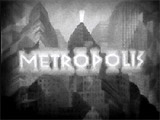

|
Metropolis
(1927, Germ.)
In Fritz Lang's science-fiction classic - a stylized,
visually-compelling, melodramatic silent film set in the dystopic,
21st century city of Metropolis - it was a dialectical treatise on
man vs. machine and class struggle. It featured inspired, expressionistic
scenes of a futuristic (year 2026), mechanized city with soaring
skyscrapers and landscapes (using miniature models).
Austrian director Fritz Lang's German Expressionistic
masterpiece helped to develop the science-fiction genre, with innovative
imagery from cinematographer Karl Freund, art design by Otto Hunte,
Erich Kettelhut, and Karl Vollbrecht, and set design by Edgar Ulmer.
It was the last of Lang's silent films. In the allegorical tale written
by Lang's wife Thea Von Harbou (from her own novel), the luxurious,
futuristic, Art Deco city of 2026 - an industrial world with skyscrapers
and bridges, was divided or stratified into an upper, elite, privileged
class of powerful industrialists and a subterranean, nameless, oppressed
and exploited, ant-like worker/slave class.
It mixed many sources in its eclectic delivery: Biblical
Old Testament references (e.g., The Tower of Babel, Moloch), the
skyline of Manhattan (inspired by Lang's 1924 visit), H.G. Wells'
1895 novel The Time Machine, Art Deco designs of the 1920s,
the angular sets, labyrinthine passages, and bold lighting of The
Cabinet of Dr. Caligari (1920, Germ.), Norse mythology, the Lon
Chaney version of The Hunchback of Notre Dame (1923) (in its
final scene), and more. It has had a lasting influence on numerous
films and other derivative works:
- the city of Metropolis appeared
with an opening montage - superimpositions of a gigantic machine
of pumping machine pistons, flywheels, a rotating crankshaft, and
an off-center disk - all parts thrusting, moving, pounding and
turning; the 24 hour clocks in Metropolis have been redesigned,
with only 10 hours on their dial; the work shift was divided into
day and night of 10 hours each, in the 20-hour day

Gears of City's Underground Machines Pumping and Spinning
|

The Society's Redesigned 10-Hour Clock
|

The Tired Workers Return to Their Underground Workers' City
|
- in one of the film's most celebrated images, two
parallel corridors contained two groups or battalions of uniformed
workers (in dark worksuits) who were lined up in rows of six; the
sullen workers (on the left) leaving the subterranean machine
area after their shift were exhausted, marching in unison only
half as fast as the new shift of fresh entering employees (on the
right); a cage-elevator took the finished day's shift of slave-workers
down to their underground living quarters in the Workers' City
- the cage sank from view; there was a major
contrast between the leisure class above ground and the underground
workers, with the giant machines, and their slum dwellings
- in the early "Eternal Gardens" Sequence,
Freder (Gustav Frohlich), the young, pampered, (motherless) son of a ruling, aristocratic capitalist
- the autocratic master of Metropolis, frolicked
with young ladies (wearing sheer and braless blouses) in a athletic
Stadium arena and in a grotto - he chased one young lady with a
backless tight black top around a circular fountain, and when he
caught her, he bent her backwards and pressed towards her for a kiss
- the frivolous scene was interrupted by the opening
of doors from the medieval underground, to the gates of the futuristic
garden above ground; emerging into the open air as a vision and apparition, the
beautiful ethereal young nurse Maria (Brigitte Helm) appeared with
a group of waif-like, hungry worker children that she cared for;
she had brought them to a forbidden artificial grotto of the ruling
class, where she told them: ("Look! These are your brothers!...Look- - !
These are your brothers!");
Freder became distracted by the virginal, motherly figure, and was
entranced and profoundly impacted by her; as Maria was escorted out
of the gardens, Freder clutched his breast with adoration, and for
the first time saw the frivolous wastefulness of life in the upper
city and the pleasure garden
- Freder voluntarily searched for Maria in
the depths of the workers' realm, where he came upon the
underground Machine Hall where the proletariat toiled and suffered
a miserable life; he had entered a part of the factory where a
giant machine (termed the M-Machine or Moloch Machine) with a monstrous
crankshaft rotating at its center was manned by twelve workers
(six workers on each side) attending to dials, blinking lights and
other controls; thrown to the ground, Freder hallucinated that
the machine's center had become the Moloch creature with eyes, nose,
Sphinx-like front paws, and a gaping maw into which the masses of
workers, now stripped and shaved bald, were fed

The Metropolis Machines
|

Six Workers On Each Side
|

One of the Exhausted Workers
|

Freder Hallucinating that the Machine Was a Moloch Creature
|
- when Freder came to his senses, he ordered to be
taken to see his father - he was driven on an
elevated highway through Metropolis, full of fantastical towering
skyscrapers, airplanes, traffic on the city's crowded streets, skycars,
bridges and arching or suspended expressways
- in the executive office of his cold, controlling
and callous ruling father, Master Joh Fredersen (Alfred Abel) ignored
his son Freder's concerns after witnessing the machine explosion;
unmoved, he coldly disregarded the pleas of his son about the suffering
of the hordes of workers; afterwards, the autocratic Fredersen
learned from Grot (Heinrich George) - the bearded
chief foreman and guardian of the Heart Machine that there were problems
with the workers (he had confiscated sketches of the underground
catacombs); Fredersen blamed the problems on his faithful assistant
Josaphat (Joseph) (Theodor Loos) and abruptly fired him; then,
the suspicious Fredersen summoned the Thin Man or Slim (Fritz Rasp),
a hired thug and henchman, to follow and spy upon his son

Freder's Ruling Father, Master Joh Fredersen (Alfred Abel)
|

Freder's Father Ignored His Son's Concerns About
Workers
|

Fredersen's Fired Assistant Josaphat/Joseph (Theodor
Loos)
|

Chief Worker-Foreman Grot (Heinrich George)
|
- after Freder went searching for Maria, he became
appalled by the horrors of the working world and the waste of life;
in the labyrinthine, underground work area, Freder made a monumental
decision - he would switch places with one of the exhausted workers,
number 11811 or Georgy (Erwin Biswanger) ("I want to trade
lives with you!"); the man's tedious
task during his ten hour shift was to maintain an electricity-routing
device -- a large clock dial -- to match up lighted bulbs on the
clock's rim with the two hands of the clock; the identity-switch
didn't turn out as expected - the worker betrayed his promised
directions and instead visited Metropolis' red-light entertainment
district known as Yoshiwara's
- meanwhile, the city's wild-haired, demented, archetypal mad scientist, alchemist and
inventor Rotwang (Rudolf Klein-Rogge) was introduced in his home speaking
to Fredersen; evidently, there was something of a love triangle between Hel, also a love interest
of Rotwang, who married Fredersen but then died during Freder's birth;
the embittered and raving inventor was obsessed with recreating
Hel; in the process of constructing a robot in Hel's image, Rotwang
lost his right hand; from behind a curtain, Rotwang revealed his
creation to Fredersen; the android was instructed to stand up,
slowly walk forward, and extend its hand toward Fredersen; Rotwang's
goal was to turn his Machine-Man into a human; he
exclaimed: "The woman
is mine, Joh Fredersen! The son of Hel was yours!"

|

|

|
|
The Unveiling and Revelation of Rotwang's Android-Robot
("The Machine-Man") to Frederer - a Recreation of Their Lost Love
Hel
|
- back toiling at the machine, Freder learned from
another worker that at two o'clock (during his major shift change),
there would be a secret meeting in the ancient subterranean, darkened
catacombs ("She has summoned us again...")

|

|

|

|

|

|
|
Maria on Altar Preaching to Comrades About Their Mistreatment
|
- Freder was stunned to again see the wistful, Christ-like,
angelic, light-haired young woman again, preaching from the altar to
a raptured audience; he was not aware that his father and Rotwang were also watching Maria
from another vantage point
- the wistful, Christ-like,
angelic, light-haired young Maria stood on an altar decorated with
tall crosses and lighted candles behind her, and preached to her
raptured comrades about the tower-building in Babel and the mistreatment
of slaves: ("Come, let us build us a tower whose top may reach unto the stars! And
on top of the tower we will write the words: Great is the world
and its Creator! And great is Man! ...but the minds that had conceived
the Tower of Babel could not build it. The task was too great.
So they hired hands for wages. But the hands that built the Tower
of Babel knew nothing of the dream of the brain that had conceived
it. BABEL One man's hymns of praise became other men's curses.
People spoke the same language, but could not understand each other.
HEAD and HANDS need a mediator! THE MEDIATOR BETWEEN HEAD AND HANDS
MUST BE THE HEART!"); she urged her comrades to peacefully
await their salvation "Wait for him! He will surely come!"
- as the assembly
dispersed, Freder and Maria gazed toward each other, each clasping
their left breast above their heart. She approached him and asked: "Oh mediator, have you
finally come?" He affirmed his commitment: "You called
me -- here I am!" - and they kissed; they planned to convene
the next day in the cathedral
- after discovering
the workers' clandestine meeting and before returning above ground, Freder's
father Joh Fredersen conspired with Rotwang, and ordered him to create
an evil, robotic Maria look-alike duplicate (explicitly created
to replace a specific human), in order to manipulate his workers
and preach riot and rebellion: ("Rotwang, give
the Machine-Man the likeness of that girl. I shall sow discord
between them and her! I shall destroy their belief in this woman
--!"; after Fredersen departed, Rotwang accurately predicted that
Joh's son Freder would be the workers' mediator against his own father
- Rotwang pursued the virtuous and compassionate union leader heroine Maria
was pursued in the catacombs with his glaring flashlight; he kidnapped
her and brought her to his alchemist laboratory, where his goal was
to create an evil doppelganger of her in his laboratory; Rotwang
had already created a robot perfect for the transformation
- disappointed that Maria didn't show the next day, Freder vowed to continue his
search for her; meanwhile in his laboratory, the evil and traitorous
Rotwang was diabolically plotting, with his Machine-Man, to
displace Fredersen as his Master and to take power all for himself:
"You will destroy Joh Fredersen - him and his city and his son"
|
The Iconic Robot-Transformation Scene:
Kidnapped Maria Lying In a Clear Cylinder, Wearing
a Helmet and Connected to the Machine-Man Robot by Wires
|
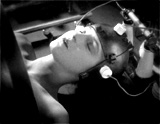
|

|

|

Electrification of the Head and Foot of the Cylinder
|

Electrical Rings Moving Up and Down on the Machine-Man Robot
|

The Transfer of Maria's Life and Likeness to the Robot
|

Heart and Circulatory System Activated
|

Robot's Head Takes On the Appearance of Maria's Face
|

Real Maria Losing Consciousness
|
- in the film's most celebrated robot-transformation
sequence, Maria was entrapped, lying horizontally in a cylindrical
clear chamber/capsule; she was connected by wires and a helmet
to the vertically positioned Machine-Man viewed behind them
- luminous, glowing rings surrounded and moved vertically
atop Rotwang's standing Machine-Man robot, as its circulatory system
was energized with Maria's life force, and Maria's face dissolved
onto the face of the Art-Deco styled, metal android - the real
Maria lost consciousness as the robot likeness became flesh and
blood; the mad scientist copied Maria's face, internal organs (heart
and circulatory system) and body onto the metal surface of the
robot; the stunning feminine, look-alike robot appeared in Maria's
image; as the robot came to life, the real Maria lost consciousness
- in the next sequence,
the newly-created robotic false Maria (also
Helm) (with one eye closed) was in the office of Fredersen; he
ordered the obedient android to discredit the real
Maria, to incite unrest in the masses and to cause the destruction
of the real Maria's work: "I want you to
visit those in the depths, in order to destroy the work of the
woman in whose image you were created!" Freder
was confused when he discovered his father there being enticed
by his own love interest; when he saw them about to embrace, he
cried out: "Maria!"
- in an avant-garde montage sequence, young Freder broke
down, signified by the background slowly going out of focus, and
his image was replaced with spheres of white light, blurry counter-clockwise
kaleidoscopic spinning and swirling of his vision (from his point
of view), jagged starbursts (appearing like scratches on the film's
negative), his unbalanced disorientation, a rotating superimposition
of Maria's face, and a frightening sensation of falling; Freder
collapsed and became dangerously ill
- in Yoshiwara's depraved nightclub, a group of
wealthy, tuxedoed men (including Freder's father and Rotwang) watched
as the false, evil robotic Maria rose on a stage platform and began
her erotic, sexy, tempting performance of a semi-nude (with pasties
on her breasts), hip-swiveling Salome-style dance ("the dance
of the whore of Babylon")
- the lecherous, staring, wide-eyed eyeballs of the lustful frenzied
men in the audience were seen in a montage
|
Maria's Enticing Nightclub Dance at Yoshiwara's
Before Lustful Men
|

Before Discarding Her Robe
|
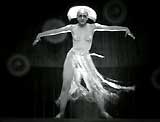
Hip-Swiveling Dance
|
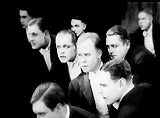
Lecherous Men
|

The False Maria
|

Lewd Poses
|
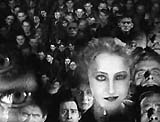
Multiple Images
|
- the false Maria's dancing incited the men, lured to
her treachery and seductiveness at Yoshiwara's, to become mad, angry
and aggressive toward each other; the only hope of the people was that
a "mediator" could keep the workers in check and save the city before
it was destroyed
- meanwhile, Rotwang kept the real Maria captive, telling her about Fredersen's
ultimate plan to stir up rebellion among the workers, to have them
abandon their machines, and then quell the workers with brutal force;
Maria was devastated by news of the false Maria: "She will destroy
their belief in a mediator!"; Rotwang revealed that he was double-crossing
Fredersen: ("Your double does not obey his will - only mine!");
he also gloated that he had kept secret the fact that Freder loved
her - the real Maria, and was her "mediator"; Rotwang didn't realize
that Fredersen was eavesdropping on him

|

|
|
Freder to the Fake Maria: "YOU ARE NOT MARIA
- !!!"
|
- at the same time, at the altar in the catacombs, the
false fanatical and beserk robotic Maria preached a new message
of protest and violent revolt to entice and prod the working class
to rebel; Freder entered the catacombs and listened as she spoke and
cried out: "You are not Maria -!!!"; when Freder was recognized, he fought off an attack; one of
the workers exhorted everyone to abandon the underground workers' city; workers marched away en masse, as
a ferocious, club-wielding mob, to destroy the machines in the Underground City
- after overhearing the words of the deceitful Rotwang,
Fredersen broke into the scientist's attic and freed the real Maria;
she raced to the city's town square to denounce the false Maria, but
watched as the mob of workers followed the imposter, destroyed the
Heart Machine (the power source for Metropolis), and flooded the
entire underground workers' city; the rising waters imperiled the
children who had not been evacuated, and the electrical lights went
out all over the city

|

|
|
Destruction of the Machines Caused Flooding, Imperiling
Workers' City and the Children
|
- Freder and the real Maria led the worker
children out of danger; after being reprimanded for senseless, irresponsible
actions that brought about the destruction of their own children, the
workers (with Grot in the lead) were convinced to seek out "the
witch" - the false Maria - who was located at Yoshiwara's with party-going revelers;
the real Maria was mistakenly targeted by the mob, but escaped, as
the false and wicked Maria was seized, dragged and
hoisted onto a large pyre of wood by the workers, tied up
to a column, and burned at the stake; momentarily, Freder thought that
his Maria was being sacrificed, until he saw that after her flesh dissoved
and burned away, her metallic robotic shape came into view

|

|

|
|
The False Robotic Maria Burned in Fiery Pyre
|
- at the same time, the real Maria was being pursued
by the now-insane Rotwang in the cathedral; during a struggle between
Freder and Rotwang on the rooftop, Rotwang lost his
balance, tumbled backwards and fell to his death - Maria was saved
and vindicated

Rotwang's Lethal Fall From Cathedral Rooftop
|

Frederer With His Son and Maria
|

Labor and Capital - United in Love
|
- in the satisfying conclusion, Fredersen was convinced
to reconcile with the workers, after having seen his son battle against
the evil Rotwang, and demonstrate his strong love for Maria; at the front
entrance to the cathedral, Maria urged Freder to be the mediator between
the workers (represented by Grot), and his ruling father/Master Fredersen - Capital and Labor
united in Love
|


The Downtrodden Masses Marching In and Out of Work

The Elite's Sports Stadium

At the Stadium, Young Freder (Gustav Frohlich)


Freder in the "Eternal Gardens" With
a Young Lady


Maria's Sudden Appearance With Worker Children ("Look!
There are your brothers!")

Freder Entranced by the Young Woman

Freder's Trip Through the Futuristic City of Metropolis

Freder Saving and Switching Places With Exhausted Worker 11811

Mad Scientist, Alchemist and Inventor Rotwang (Rudolf Klein-Rogge)

The Revelation of Rotwang's Robot ("Machine-Man") to Fredersen

Rotwang's Android-Robot

Freder Toiling at the Workers' Job

Sketch of the Underground Catacombs


After the Secret Meeting, Maria and Freder Fall in Love and Kiss

Frederer and Rotwang Plotting Together to Destroy Maria and the
Workers

Rotwang Stalked and Kidnapped a Fearful Maria in the Catacombs


Rotwang's Lab With Beakers, Bubbling Liquids, etc.

The False Maria with Frederer In His Executive Office

The Evil Look-Alike Robotic Maria With One Eye Slightly
Shut


Freder Stunned by Seeing 'Maria' With His Father

One Image in Freder's Hallucinatory Montage

Rotwang With the Captive Real Maria
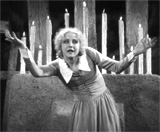

The False Maria Preaching Revolt to the Masses of Workers



Workers Carrying Off the Fake Maria, Leading the Mob to Destroy the Machines

The Real Maria Fearful of a Coming Flood

The Real Maria Saving Children From Rising Water

Freder Reunited with the Real Maria


The Real Maria and Freder Saving the Children From Flood
|








































